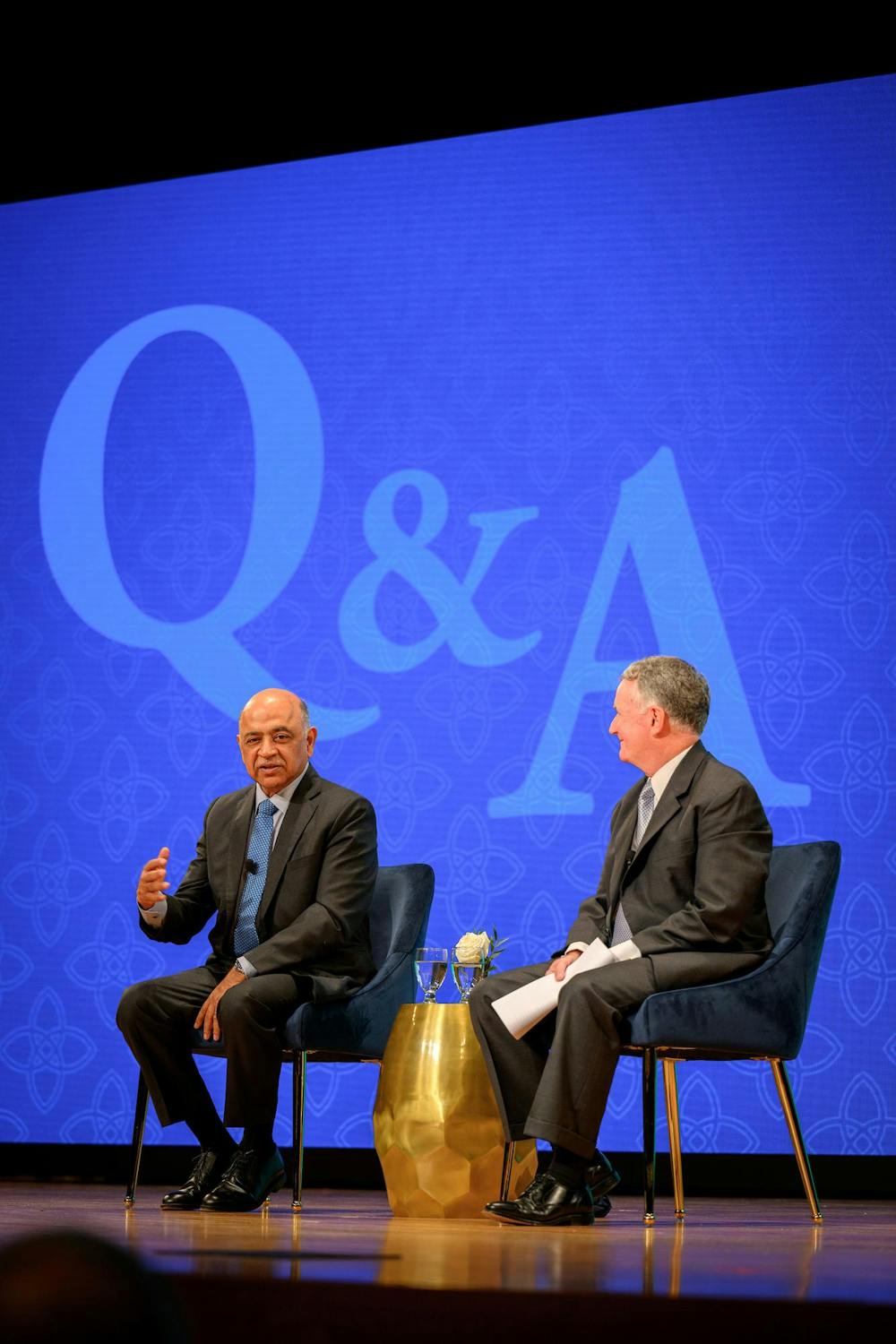On Thursday morning in the DeBartolo Performing Arts Center, Arvind Krishna, chairman and CEO of IBM, sat down for a conversation with John Veihmeyer, chairman of the Notre Dame Board of Trustees and former global chairman of KPMG, discussing artificial intelligence and “the future of responsible tech.”
The talk was the first of four ND Forum events of the day on the topic “What do we owe each other?”
After Veihmeyer thanked Krishna for his support of Notre Dame, Krishna began his remarks by offering praise for Notre Dame students.
“I think we get back a lot more than we give to Notre Dame, because so many of your students join us and the work that they do at IBM, I think more than repays us for the work that we do here,” he said.
Krishna emphasized his job as CEO of IBM is about both developing and explaining technology.
“You’ve got to learn both sides of that equation. I mean, you got to get the technology, but you’ve also got to be able to explain to people how to distribute it, how to sell it and what’s the size of the market,” he said.
When asked to explain the rapid development of artificial intelligence in recent years, Krishna compared it to the rise of Wi-Fi in the 1990s. He explained that the technology behind both Wi-Fi and artificial intelligence had been possible for five to ten years before it became popular, but only exploded on the public scene once it became accessible and profitable.
Krishna also noted the fact that the material produced by artificial intelligence is more digestible and easier to understand than in the past. He cited an estimate by McKinsey & Company that artificial intelligence will represent $4 trillion in market share by the end of the decade.
Krishna said the developments in artificial intelligence will create better and more efficient designs for products and make government agencies more efficient.
With this practical and economic potential, however, Krishna stressed companies must be responsible in how they use the technology, specifically when it comes to how artificial intelligence models are sourced. He cited the danger in sourcing artificial intelligence from other generated content. Along those lines, he emphasized technology companies must be transparent about where they source their artificial intelligence and take responsibility for how it performs for their clients.
“We say that you should hold the inventor or builder of these models accountable for what went into it, as opposed to that you have complete immunity,” Krishna stated. “I think if you hold people accountable, then the people tend to behave better.”
When asked whether the rise in artificial intelligence would decrease job opportunities, Krishna explained the situation is complicated. Because of the decreasing population in Western countries, he said, artificial intelligence may be necessary in order to make a smaller workforce more productive.
“We have fewer and fewer people to do all the tasks we need as we go along, so we are going to need help from all these technologies to do all that,” he said.
Krishna did acknowledge that a certain number of repetitive jobs may be replaced as artificial intelligence is more widely deployed across the economy.
When it comes to Notre Dame students, however, Krishna said he wasn’t worried.
“This is probably less of an issue for Notre Dame than it is for some other places,” he said. “They’re coming out of spaces like this with extreme rigor, with extreme critical thinking skills, with the depth of many, many different aspects.”
In the long run though, Krishna stressed that AI will make the workforce more efficient, creating more jobs which are impossible to imagine at the moment.
“If there is a productivity advantage, you are going to create a whole set of new jobs,” he explained. “People who use AI are going to displace people who don’t use AI.”










